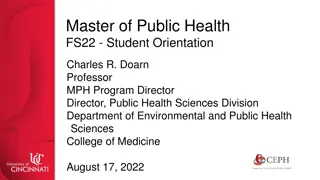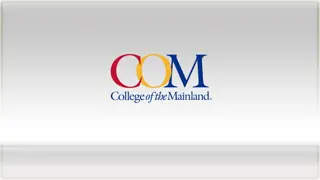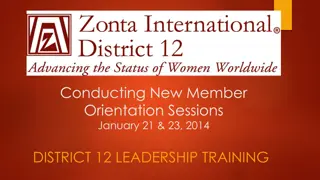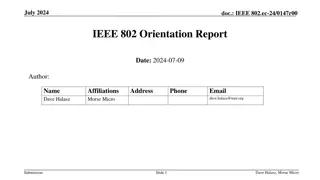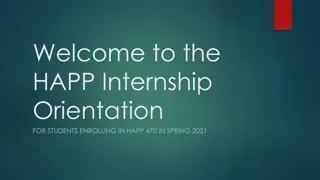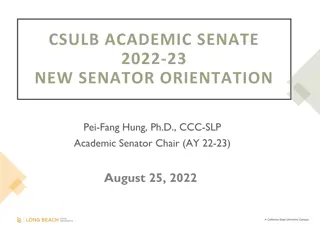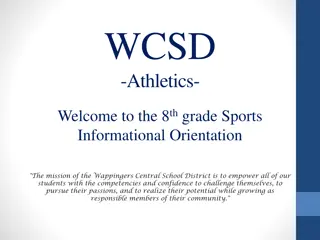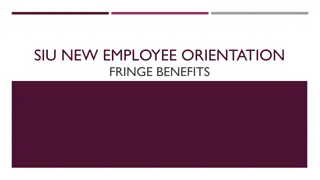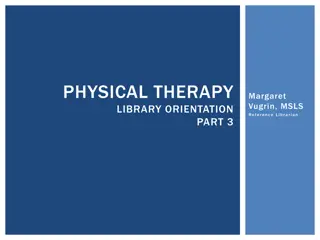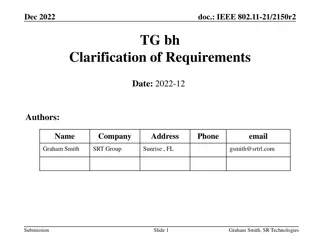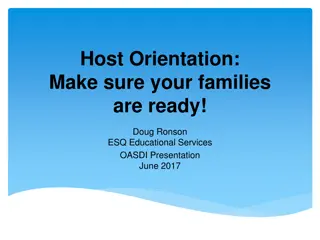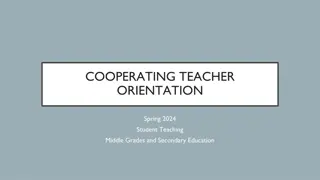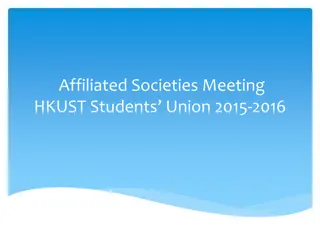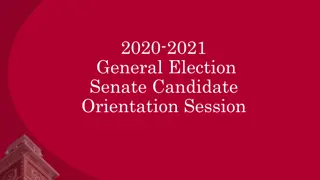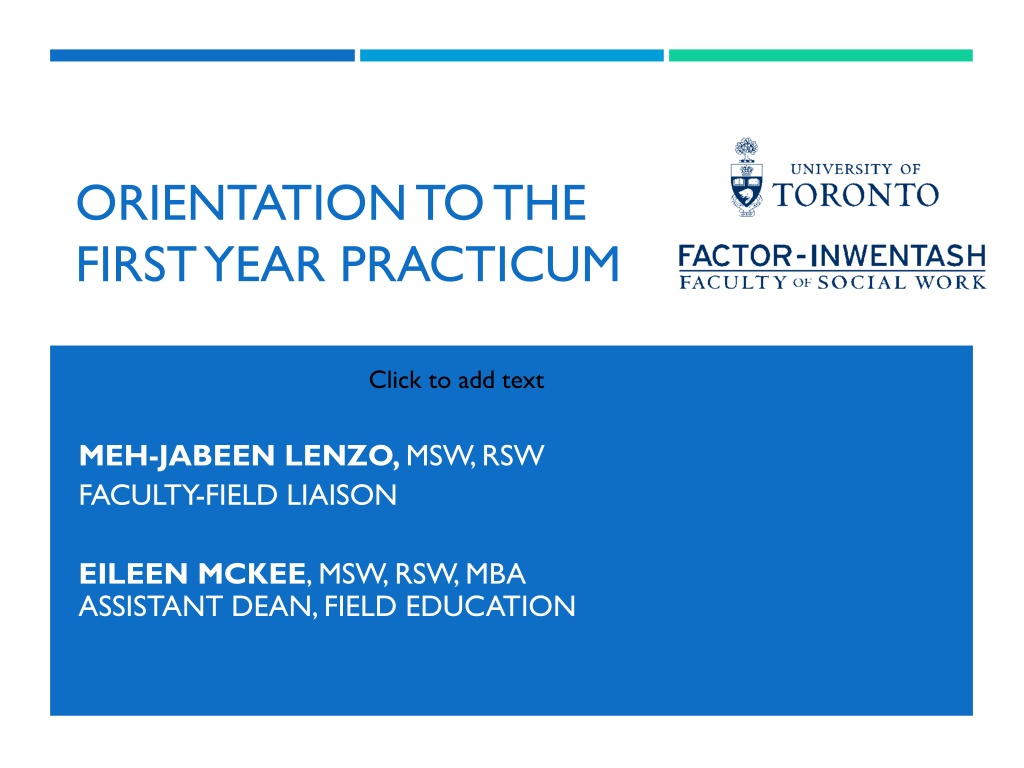
First Year Practicum Orientation and Resources
Explore the orientation to the first year practicum, covering topics such as practicum timelines, roles of the field instructor, linking theory to practice, and resources for students and instructors. Get key dates for the practicum and important sessions.
Download Presentation

Please find below an Image/Link to download the presentation.
The content on the website is provided AS IS for your information and personal use only. It may not be sold, licensed, or shared on other websites without obtaining consent from the author. If you encounter any issues during the download, it is possible that the publisher has removed the file from their server.
You are allowed to download the files provided on this website for personal or commercial use, subject to the condition that they are used lawfully. All files are the property of their respective owners.
The content on the website is provided AS IS for your information and personal use only. It may not be sold, licensed, or shared on other websites without obtaining consent from the author.
E N D
Presentation Transcript
ORIENTATION TO THE FIRST YEAR PRACTICUM Click to add text MEH-JABEEN LENZO, MSW, RSW FACULTY-FIELD LIAISON EILEEN MCKEE, MSW, RSW, MBA ASSISTANT DEAN, FIELD EDUCATION
WHAT WE WILL DISCUSS TODAY Resources and updates Practicum & Evaluation Timelines Our Student Cohort Roles of the Field Instructor Linking theory to practice Preparing for the start of practicum Resources for you and your student Question & Answer
RESOURCES FOR YOU AND YOUR STUDENT For Students: On line resources to view before practicum starts: Good2Talk: 1-866-925-5454 (confidential for post-secondary students) Bridge to Practicum: Competency Domains (13 min) https://good2talk.ca/ontario/ https://play.library.utoronto.ca/downloa d/jbRrmfNib7y5 Text GOOD2TALKON to 686868 Faculty Field Liaison: confidential enquiries Resource Room: FI Simulations http://socialwork.utoronto.ca/practicum /resource-room For Field Instructors (FI): Faculty Field Liaison: confidential enquiries
PRACTICUM TIMELINE Classes Mondays & Tuesdays Practicum Jan 5 April 1, Wednesday Friday (21 hrs /wk) until classes finish Feb 21 = Reading week = no practicum April 5 May 27 , Tuesday Friday (28 hrs/wk) April 15* = no practicum 67 days @ 7 hrs / day = 469 hours *Students cannot be in practicum, without explicit permission from the FFL / Practicum Office (PO) to ensure access to UT institutional support
KEY DATES (ALL VIA ZOOM) January 3 or 4: FFL/student group meeting #1 January 5: First day of Practicum I January 6: Checklist I: Practicum Safety and Learning an important policy step for all, January 14: 9am Power & Authority session for FI and students together January 21: 9am FI PD Check in and to cover Learning Contract steps January 25: 12pmFFL/student group meeting #2 re Learning Contract February 4: Learning Contract: Due to FFL February11: Checklist II: Practicum Learning and Reflection submitted to PO March 8: 12pm FFL/student group meeting #3. Preparing for Mid-term March 4: 9amFI PD re mid-term evaluation March 25: Mid term evaluation: Due ~Student & FI complete separately on PAS; April 4, 2022, 12pm FFL/student group meeting #4. Transitions and Termination May 27: Final evaluation: Completed independently on PAS
WHO ARE THE CURRENT YEAR 1 STUDENTS? Mostly young, female & recent grads of honours BA Increased diversity in ethnicity, race, language & culture (e.g. income disparity; sexual orientation; various lived experiences) Digital natives; multiple degrees & universities High expectations of self; accustomed to high grades in academia Have and use pronouns she/he/they Varied and rich volunteer experience which may not be supervised; requires social work lens / theory /perspective Jan 2022= first MSW social work practicum (keen & anxious)
ROLES OF THE FIELD INSTRUCTOR WHAT DO STUDENTS VALUE?
PRACTICUM FIELD INSTRUCTORS ARE VITAL Studies show the field instructor the most influential factor in how new social work grads practice Up to five years after graduation this influence remains intact Students purposefully & unconsciously integrate the FI values, perceptions & behaviours (even mannerisms) Questions: What do you remember about your field instructor? What do you remember about your field practicum?
RESEARCH TELLS US WHAT ELEMENTS STUDENTS VALUE EMOTIONAL SUPPORT: (eg. learning style(doers/thinkers); emotional self-regulation STRUCTURE: weekly field sessions & agenda; documentation; managing free time TEACHING: Professional role model & query; shadow other staff; discussions and challenges; formal events EVALUATION: Weekly constructive feedback & formal evaluations at mid & final. GATEKEEPER TO PROFESSION: Access to competent service on behalf of clients & their systems
CULTURAL AWARENESS UNDERLIES TEACHING STUDENTS THE REQUIRED COMPETENCIES We acknowledge that students ( & FI/ agency) possess cultural attributes, beliefs, values, and behaviours that impact their learning (teaching) approaches and may influence: assessment/intervention in practicum teaching & learning in the FI-student dyad & organization Methods of learning & teaching Can be adapted End goal is that students need to understand (cognition) & acquire (demonstrate) the Social Work Knowledge, Skills, and Values required in our professional Code of Ethics
STUDENTS TELL US WHAT THEY APPRECIATE After final evaluation (end of May) students respond to 'feedback' form. Students appreciate Welcoming environment Comprehensive orientation Observation of / by field instructor and others Supportive constructive feedback Challenges (examples to follow) Participation in a range of meaningful activities
LINKING THEORY TO PRACTICE METHODS AND QUESTIONS
IN FALL SEMESTER: LAB EVALUATION SUMMARY (LES) Student brings their Elements & Lab instructor s LES, with comments re: Self-direction, use of self/learning and growth Work productively with colleagues/behaviour in the organization Link concepts with competencies & skills/conceptualizing practice Collaborative relationship/clinical relationship Conduct an ecosystemic assessment and plan/execute intervention Professional communication 1. 2. 3. 4. 5. 6. LES should be reviewed early on AND when doing Learning Contract
DOMAIN 1: USE OF SELF IN LEARNING & GROWTH In Fall Semester lab, students encouraged to: Lean into discomfort Focus on client Provide self compassion re making errors Articulate awareness of emotional (dys)self-regulation Affect Tolerance If you can name it, you can tame it. Articulation of feelings diminishes the power
QUESTIONS TO ASK In Domain 1: Learning and Growth, ask your student: How will you assess your own skills and values throughout the practicum time span? Perhaps compare lab ending with practicum transitions and Practicum 1 ending What challenges have you struggled with when attempting to apply theory to practice? What bias might you bring in practicum learning tasks? How will you manage this? What personal strengths will you draw from?
DOMAIN 2: BEHAVIOUR IN THE ORGANIZATION Discuss with your student: Formal and unspoken norms at the agency? How are these learned? How does communication occur? (eg email; ad hoc; restricted to sub-groups etc) How do decisions get made? What kind of worker behaviour is expected & rewarded ? How are students regarded?
DOMAIN 3: CONCEPTUALIZING PRACTICE I m interested to know what you are studying in your course work that is relevant to your practicum experience whether direct practice or indirect organizational theory, systems, evaluation, etc. I d like you to share with me (now or at next meeting) what theoretical concepts could be / are relevant to social work at this agency. How can I assist you to consider diversity & structural issues as you attempt to apply theory & research to direct practice (interviewing, assessment, & intervention)?
MORE QUESTIONS TO LINK THEORY AND PRACTICE Using the CASW Code of Ethics or mission statement/agency policies, what are relevant ethical & accountability considerations in this practicum? How can we promote critical thinking in relation to applying research & theory to practice situations? What is your learning objective with this intervention you are planning? How will you evaluate? How will you know if you have been successful?
PREPARING FOR THE START OF PRACTICUM IDEAS AND SUGGESTIONS
TASKS PRIOR TO ARRIVAL E-mail student to build relationship and maintain presence Invite to relevant events and meetings (e.g. create an orientation schedule) Prepare relevant reading materials, including examples of agency recordings, documentation, journal articles Review potential learning activities Notify colleagues with an announcement How can you educate the organization about the student s role?
What might you discuss at your first meeting together?
CONSIDER FOR FIRST DAY Orient to physical setting, including: Warm welcome! Introduce to the larger team. Universal policies, especially around privacy & confidentiality Emergency procedures and safety measure Office resources and training (plan ahead if set-up needed) space, email address,telephone system; access to computer / IT training; photocopying; keys Some settings have formal orientation
FIRST MEETING Introduce yourself and get to know your student: What are you most curious about? What can I do to support your success? Answer student questions about practicum, logistics, space, etc. Help manage expectations re: your communication style, availability, in-office/remote work presence, etc.
HOW WILL LEARNING BE DEMONSTRATED IN A WRITTEN METHOD? Access agency experts for written resources & role model observations Challenge student to link theory to practice (Bogo s ITP LOOP). (Refer to research to instill a life-long professional behaviour) Complete Process Recordings & Reflection logs (again, self-reflection / use of self is a social work competency.) Discuss content, frequency, when to be submitted, & returned Written analysis of an audio or video portion of a meeting /interview. http://www.socialwork.utoronto.ca/practicum/manual/av.htm#tape Assign responsibility for autonomously planning part of the supervision agenda and notes
POTENTIAL BEGINNING TASKS Have student observe you or a team meeting Provide structure before the event ( eg. discuss themes or topics for observation) Encourage students to make theory-practice linkages (eg discourage just describing events/persons; instead talk about communication patterns, participant roles, organizational ethos, ethical dilemmas etc) Debrief with your student afterwards
THANK YOU Meh-Jabeen Lenzo mehjabeen.lenzo@gmail.com Mehjabeen.lenzo@utoronto.ca Eileen McKee e.mckee@utoronto.ca




